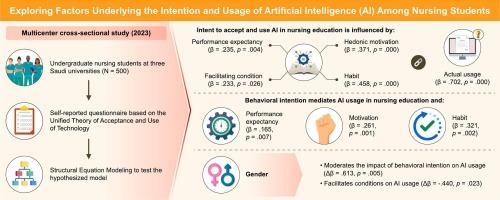Factors affecting Artificial Intelligence usage intention among nursing students: Unified theory of acceptance and use of technology
IF 4.2
2区 医学
Q1 EDUCATION, SCIENTIFIC DISCIPLINES
引用次数: 0
Abstract
Background
Nursing students' acceptance and usage of AI are crucial for embracing and implementing the technology in nursing practice in the future. However, there is a lack of literature to examine the factors affecting AI usage intention among nursing students.
Aim
This study examined a hypothesized model based on the unified theory of acceptance and use of technology (UTAUT2). The intention to use AI mediates the impact of performance expectancy, effort expectancy, social influence, facilitating conditions, hedonic motivation, price value, and habit on nursing students' AI usage. Gender was expected to moderate these relationships.
Methods
Employing a multicenter cross-sectional approach, this study was conducted across three Saudi universities between September and October 2023 with 500 undergraduate nursing students. The variables were measured using a self-report questionnaire originally developed based on UTAUT2. The internal consistency of the latent variable items and convergent, divergent, and construct validity were assessed. Structural equation modeling was conducted to test the hypothesized model.
Results
Performance expectancy (β = 0.235, p = .004), facilitating conditions (β = 0.233, p = .026), hedonic motivation (β = 0.371, p < .001), and habit (β = 0.458, p < .001) influenced AI usage intention, which significantly affected actual AI usage (β = 0.702, p < .001). Behavioral intention mediated the relationship between AI usage in nursing education and performance expectancy (β = 0.165, p = .007), motivation (β = 0.261, p = .001), and habit (β = 0.321, p = .002). Gender moderated the effects of behavioral intention (Δβ = 0.613, p = .005) and facilitated conditions (Δβ = −0.440, p = .023) on AI usage.
Conclusions
The findings will help stakeholders promote AI usage among future nurses. They highlight the need for interventions and strategies to enhance the perceptions of AI's benefits, resource availability, and individuals' enthusiasm and usage habits.

护生人工智能使用意愿的影响因素:技术接受与使用的统一理论
护生对人工智能的接受和使用对于未来在护理实践中接受和实施人工智能技术至关重要。然而,对于护生使用人工智能意愿的影响因素,目前缺乏相关文献的研究。目的研究基于技术接受与使用统一理论(UTAUT2)的假设模型。使用人工智能意愿中介了绩效期望、努力期望、社会影响力、促进条件、享乐动机、价格价值和习惯对护生人工智能使用的影响。性别被认为会缓和这些关系。方法采用多中心横断面方法,于2023年9月至10月在沙特三所大学进行了500名本科护理专业学生的研究。使用最初基于UTAUT2开发的自我报告问卷来测量变量。评估了潜在变量项目的内部一致性以及收敛效度、发散效度和构念效度。采用结构方程建模对假设模型进行检验。结果绩效期望(β = 0.235, p = 0.004)、便利条件(β = 0.233, p = 0.026)、享乐动机(β = 0.371, p <;.001),习惯(β = 0.458, p <;.001)影响人工智能使用意图,显著影响人工智能实际使用(β = 0.702, p <;措施)。行为意向在护理教育中人工智能使用与绩效预期(β = 0.165, p = .007)、动机(β = 0.261, p = .001)和习惯(β = 0.321, p = .002)的关系中起中介作用。性别调节了行为意向(Δβ = 0.613, p = 0.005)和便利条件(Δβ = - 0.440, p = 0.023)对人工智能使用的影响。结论研究结果将有助于利益相关者在未来护士中推广人工智能的使用。他们强调需要采取干预措施和战略,以增强对人工智能的好处、资源可用性以及个人热情和使用习惯的认识。
本文章由计算机程序翻译,如有差异,请以英文原文为准。
求助全文
约1分钟内获得全文
求助全文
来源期刊

Nurse Education Today
医学-护理
CiteScore
6.90
自引率
12.80%
发文量
349
审稿时长
58 days
期刊介绍:
Nurse Education Today is the leading international journal providing a forum for the publication of high quality original research, review and debate in the discussion of nursing, midwifery and interprofessional health care education, publishing papers which contribute to the advancement of educational theory and pedagogy that support the evidence-based practice for educationalists worldwide. The journal stimulates and values critical scholarly debate on issues that have strategic relevance for leaders of health care education.
The journal publishes the highest quality scholarly contributions reflecting the diversity of people, health and education systems worldwide, by publishing research that employs rigorous methodology as well as by publishing papers that highlight the theoretical underpinnings of education and systems globally. The journal will publish papers that show depth, rigour, originality and high standards of presentation, in particular, work that is original, analytical and constructively critical of both previous work and current initiatives.
Authors are invited to submit original research, systematic and scholarly reviews, and critical papers which will stimulate debate on research, policy, theory or philosophy of nursing and related health care education, and which will meet and develop the journal''s high academic and ethical standards.
 求助内容:
求助内容: 应助结果提醒方式:
应助结果提醒方式:


